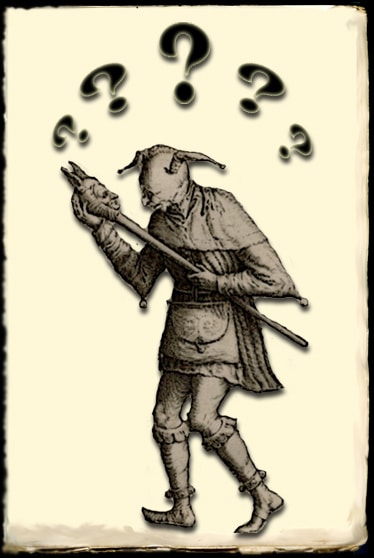During my typical day as a tarot reader, I get a wide variety of questions tossed at me by my clients. It runs the gamut from typical romantic issues to more complex situations such as connecting with a departed loved one. I never know what to expect and have always allowed my clients to feel as if they can bring any question to the table.
In some cases a client may ask something that pushes outside my comfort zone. This is not odd as you think as most tarot readers have guidelines about what is an acceptable question to ask and boundaries vary greatly from reader to reader. (For example, some tarot readers do not answer any questions about health while others have no issue with this.) Each reader finds their own “code of ethics” that suits their needs and the needs of their clients.
I often find myself contemplating about what makes a question “acceptable” or “unethical”. Are there some questions a reader should refuse to answer? And if you are not comfortable with a question, is there a way to still help the client find direction? Can we safely have a universal “code of ethics” or should that be left up to the reader?
- Most tarot readers are NOT lawyers, doctors, stock brokers or licensed therapists. We should never take the place of these professionals. That being said, we can answer general questions about these fields but it is still in the best interests of the reader and the client to refer them to a professional. Doing otherwise puts the reader and the client in a possibly risky and legally compromising position. I am careful about how I answer these types of questions and I always keep a list of professionals for referrals. An example: rather than give legal advice, I might look and see if the outcome of a case is favorable to a client. That is still helpful for them but I am not assuming the role of a lawyer.
- Some tarot readers will not answer a question about a third party as they see this as “spying”. I feel differently about this as giving a client insight into another person may pave the way for communication, compassion and understanding. I encourage follow up questions such as “how can I help” which can empower the client to make better decisions regarding their relationships. If you are not comfortable answering questions about others, let the client know and see if you can rephrase the question in a manner that still gives the client helpful information.
- Criminal activity is a dicey topic and giving advice here could put you in hot water should you be called to testify against a client. In some situations, you might even be seen as party to a crime (ex: giving information on “how” to get away with an offense). Yes, do not be surprised – criminals DO come to tarot readers seeking advice! Typical questions may include “am I being watched” and “who can I trust”. But some may ask heavier questions and you may find yourself nervously turning over those cards, wondering if you are putting someone’s life at risk. This is where I have learned to draw the line. In my opinion, if a person is seeking my services only to become a better criminal rather than a better person, then I need to disconnect.
- If you are uncomfortable with any question, it is best to be honest with your client. See if you can rephrase questions in a way that still helps them get information while maintaining your boundaries. And do not ever shame your client by saying something such as “that is against my code of ethics”. This makes the client feel judged for wanting the information they feel they need.
- A universal code of ethics may be difficult to apply simply because each reader is different and each client is unique. Some tarot organizations have a set of standards that their members agree to abide by. This is not a bad idea but you may want to contemplate if these guidelines work for you as a reader and ask if there is room for flexibility. Do not agree to anyone else’s rules of conduct unless you are absolutely sure that you can stick with it.
Ultimately, this is all a matter of personal preference. For myself, respect and compassion for my clients is always my number one priority. I try to serve their needs in any way that I can as I know that sometimes this is the last place they turn to when they need insight into their problems. It is not my job to judge what they ask but to find a way to answer their questions with dignity and compassion.
I’d love to hear your thoughts on using the tarot to answer questions. What do you feel is the best way to handle questionable questions? Is there a way that you think clients should ask questions?
Blessings!
Theresa
image by Taoxproductions


 I’m Theresa Reed (aka, The Tarot Lady). I’ve been a full-time tarot reader for 30+ years — which, in my industry, makes me pretty badass.
I’m definitely not your average Tarot expert — I drop the F-bomb, I quote rappers, and I’m obsessed with pop culture + reality TV. Folks come to me for straight-talk + tough-love — without the woo-woo fluff.
I’m Theresa Reed (aka, The Tarot Lady). I’ve been a full-time tarot reader for 30+ years — which, in my industry, makes me pretty badass.
I’m definitely not your average Tarot expert — I drop the F-bomb, I quote rappers, and I’m obsessed with pop culture + reality TV. Folks come to me for straight-talk + tough-love — without the woo-woo fluff.
You must be logged in to post a comment.